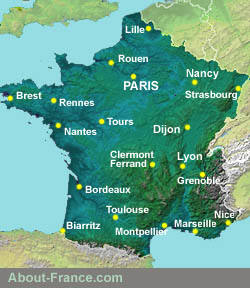- Explore France ►
- KEY PAGES
- Where to go
- How to get there
- Learn about France
Pronouns 2
:
on, ce and ça
Ce, ça and on - neutral third person pronouns
1. Ce and ça
►"Ce" or "ça" are third person singular subject pronouns. "Ce" is also used as a third person plural subject pronoun.►There are two forms of ce, the full form, and the abbreviated form c', used in front of a vowel.
►To simplify matters, one might say that "ce" and "ça" are the equivalent French pronouns to the English pronoun "it". But of course things are not as simple as that, and the usage of ce and ça by no means always corresponds to the usage of it in English.
1.1. "Ce" or "ça" corresponding to the English pronoun "it".
"Ce" (often "c' ") is used as a third person neutral or impersonal subject pronoun before the verb être, and in this respect it normally corresponds to "it". When used before the third person plural of être, it either corresponds to"it" or to "they".
"Ça" (a contraction of cela) is frequently used as the neutral or impersonal subject pronoun before other verbs, and in this respect it usually corresponds to "it" - but also to that.
Examples:
C'est fantastique !
It's fantastic !
Ce sera le dernier concert de l'année.
It'll be the last concert of the year.
Ce sont mes parents.
They're my parents
Ce sont mes parents qui me l'ont donné.
It's my parents who gave it to me.
Ça dépend de ce qu'il dira
It depends on what he says.
Tu vas chez le dentiste? ça va faire mal... ou plutôt il va faire mal !
Are you going to the dentist? It'll hurt,... or rather he'll hurt !
(Note this difference)
C'est fantastique !
It's fantastic !
Ce sera le dernier concert de l'année.
It'll be the last concert of the year.
Ce sont mes parents.
They're my parents
Ce sont mes parents qui me l'ont donné.
It's my parents who gave it to me.
Ça dépend de ce qu'il dira
It depends on what he says.
Tu vas chez le dentiste? ça va faire mal... ou plutôt il va faire mal !
Are you going to the dentist? It'll hurt,... or rather he'll hurt !
(Note this difference)
1.2. When to use ce and when to use il at the start of a sentence or clause.
C'est / il est followed by a noun.
The noun will normally be introduced by c'est, especially if it is followed by a relative clause.
But when the noun defines a job or position and is used with no article, then it will normally be introduced by the personal pronoun structure il est / elle est.
Examples:
C'est ma soeur !
It's (she's) my sister !
Ce sont mes parents qui me l'ont donné.
It's my parents who gave it to me.
C'est la tempête qui a coulé le bâteau
It was the storm that sank the boat.
Ce sera la dernière fois que je le ferai pour toi !
It'll be the last time I do it for you !
Je pense que c'est un architecte !
I think he's / she's / it's an architect.
Je pense qu'il / elle est médecin.
I think he's / she's a doctor.
(Note this difference)
C'est ma soeur !
It's (she's) my sister !
Ce sont mes parents qui me l'ont donné.
It's my parents who gave it to me.
C'est la tempête qui a coulé le bâteau
It was the storm that sank the boat.
Ce sera la dernière fois que je le ferai pour toi !
It'll be the last time I do it for you !
Je pense que c'est un architecte !
I think he's / she's / it's an architect.
Je pense qu'il / elle est médecin.
I think he's / she's a doctor.
(Note this difference)
Neutral C'est / il est followed by an adjective.
The adjective will normally be introduced by c'est, if it closes the statement, and does not lead on to a subordinate clause.
The adjective will normally be introduced by il est, if it leads on to a subordinate clause.
Examples:
C'est très difficile !
It's very difficult !
Mais c'est parfait !
But its / that's perfect !
Il est très difficile de trouver la bonne réponse !
It's very difficult to find the right answer.
C'est très difficile !
It's very difficult !
Mais c'est parfait !
But its / that's perfect !
Il est très difficile de trouver la bonne réponse !
It's very difficult to find the right answer.
2. On
The third person singular personal pronoun on is very common in French, and does not just correspond to the English pronoun "one". The French use on in cases where English speakers might use one, we, you, someone, they or even a passive verb form. The extensive use of on, particularly in informal and spoken French, is best explained by means of examples.► Note that the pronoun "on" exists only as a subject pronoun; it has no object form, and no possessive form. If a possessive form is required, the speaker / writer will use the first or third person possessive form best matching the persons implied by the "on"; if "on" is really being used in an impersonal sense, then the possessive pronouns to use are those corresponding to il (i.e. son, sa, ses).
Examples:
On ne peut pas faire ça !
One / We / You can't do that !
On va voir ce qu'il va faire quand il reviendra.
We'll see what he does when he gets back.
Je pense qu'on va être très déçu, n'est-ce pas !
I think you'll / we'll / they'll be very disappointed, won't you / we / they ?
J'en ai marre ! C'est la seconde fois qu'on m'a volé ma voiture !
I'm fed up! That's the second time my car's been stolen !
J'ai entendu dire qu'on va fermer notre bibliothèque départementale !
I've heard it said that they're going to close our departmental library. or
I've heard it said that our departmental library's going to be closed.
Il m'a dit qu'on peut faire ce qu'on veut !.
He told me you/we can do what you/we like.
On doit s'occuper de ses enfants !
One has to look after one's children ! or
You have to look after your children.
On doit s'occuper de nos enfants !
We have to look after our children ! or
One has to look after our children. or
Someone has to look after our/your children ! (according to context)
On a peur... ça vous fait peur, n'est-ce pas !
One gets frightened.... it frightens you/ one, doesn't it !
(With no object form for on, a French speaker must choose another object pronoun; English does not have this problem)
On ne peut pas faire ça !
One / We / You can't do that !
On va voir ce qu'il va faire quand il reviendra.
We'll see what he does when he gets back.
Je pense qu'on va être très déçu, n'est-ce pas !
I think you'll / we'll / they'll be very disappointed, won't you / we / they ?
J'en ai marre ! C'est la seconde fois qu'on m'a volé ma voiture !
I'm fed up! That's the second time my car's been stolen !
J'ai entendu dire qu'on va fermer notre bibliothèque départementale !
I've heard it said that they're going to close our departmental library. or
I've heard it said that our departmental library's going to be closed.
Il m'a dit qu'on peut faire ce qu'on veut !.
He told me you/we can do what you/we like.
On doit s'occuper de ses enfants !
One has to look after one's children ! or
You have to look after your children.
On doit s'occuper de nos enfants !
We have to look after our children ! or
One has to look after our children. or
Someone has to look after our/your children ! (according to context)
On a peur... ça vous fait peur, n'est-ce pas !
One gets frightened.... it frightens you/ one, doesn't it !
(With no object form for on, a French speaker must choose another object pronoun; English does not have this problem)
| Return to French grammar pages : index | Study or learn French in France | Essential French words and phrases for travellers |







